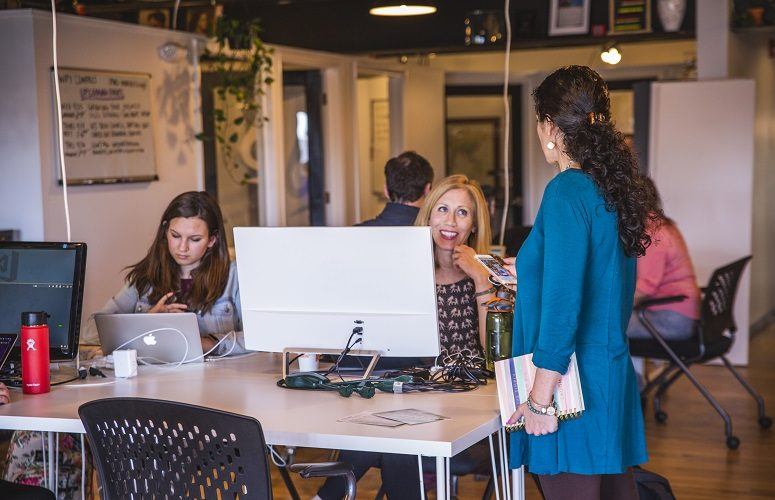
The Coworking Space Experience
Discover the many benefits of this growing workspace trend.
By Anthony Birritteri, Editor-in-Chief On Jul 18, 2019A collaborative classroom of peers with budding entrepreneurs and small startups sharing space, networking and, perhaps even better, combining their respective talents to obtain new clients and grow their ventures. To many users, this is what being in a coworking space is all about, and luckily, New Jersey has a vast array of such facilities.
The coworking concept has been around for decades and traces its roots back to the mid-1990s and the development of hackerspaces, places where people with a strong interest in computers or technology would gather and collaborate on projects – or at least share ideas and knowledge.
Sean Donohue, manager of Holmdel-based coworking space Colab at Bell Works, brings up the term “Jellies” in talking about the evolution of the industry. Jellies, he says, are after-work places, an apartment for example, where people would invite their fellow workers or industry peers to network.
According to the website Shareable.net, a Jelly is “a casual coworking event where freelancers, home workers and people running small businesses meet in order to get out of their normal space, meet some new people and work together in a social environment.”
“You saw these types of spaces in Manhattan as early as the late 1990s to early 2000s. Then WeWork burst onto the scene around 2011 and sort of educated everyone on what coworking really is,” Donohue tells New Jersey Business.
There are many benefits of locating in a coworking space. Bret Morgan, co-founder of Asbury Park-based Cowerks, states the most important: “The coworking environment allows you to tap into a community and work around peers who may not be doing exactly what you are doing, but there is this vertical integration where business and personal goals are mutually aligned.” As for Cowerks, he says that, “at its core, it is a community space for entrepreneurs to connect and grow their businesses.”
One cannot ignore that fact that renting space on a monthly basis at a coworking facility avoids the costs and risks involved with, for example, signing a five-year lease for commercial office space with a personal guarantee if the startup business entity cannot pay rent.
Chris Schultz, CEO of national coworking company Launch Pad, which chose the city of Newark as its second US location after New Orleans, says that most startups don’t know if their ventures will be around for six months, much less five years. “So, that’s the big factor of joining a coworking space. You can decide on a month-to-month basis if you want to renew your membership,” he says.
The monthly costs at coworking spaces vary by operator and rental tiers or packages.
At Launch Pad, which opened in November of 2018 on the second floor of the Hahne & Company building in Newark, rent for table space is $250 per month, a permanent desk is $450 and private offices start at $1,000. The smallest office is roughly 100 square feet, suitable for two people, while the largest is 500 square feet, suitable for 8 to 10 people. The entire facility consists of 14,000 square feet. In that space one will find 31 desks, 36 offices and 36 coworking stations.
Cowerks has two locations in Asbury Park: 619 Lake Avenue, which consists of 5,000 square feet, and 21 Main Street, which consists of 9,400 square feet (60 percent of which is available coworking space). A user can rent a desk for $30 per day or $300 per month. There is a 10-day package at $175 per month, and private offices range from $600 per month for one person to $2,300 for an 8-to-10 person team suite. Combined, the two Cowerks facilities have close to 500 members, and between 50 to 75 members use the spaces on a daily basis.
Morgan and his business partner Danny Croak opened their first Cowerks location in 2010. They believe they are the first coworking space to open in New Jersey. Additionally, the team is actively looking at Monmouth, Ocean and Mercer counties for new locations in which to expand.
Colab at Bell Works opened in early 2016. Currently, there are four separate coworking spaces inside the vast 2-million-square-foot Bell Works complex consisting of a total of 20,000 square feet. The operation, part of Somerset Development (redeveloper of the former Bell Labs facility), is now consolidating these four locations into one 30,000-square-foot site at the complex.
According to Donohue, more than 80 businesses are using Colab; this equates to 180 members. Users can rent space for as little as $25 per day, $90 for five days per month, $325 for monthly full-time shared desk space, $425 for dedicated desks, and $800 to $900 for private offices.
All of the coworking spaces mention above offer conference rooms, high speed Wi-Fi and hardline internet access, shared printers and copiers, and kitchen areas with coffee (Launch Pad offers tap beer chosen from a revolving selection of local brewers). All spaces offer 24/7 access, typically for dedicated full-time monthly users.
The User Experience
Donohue says he could talk all day about the coworking industry, but he stresses that it is the people using the facilities that “make the space.”
For that reason, New Jersey Business magazine reached out to two Colab users: Daria Placitella, president and CEO of Hope Trust, and Kevin Liptak, owner and CCO of Refresh Advertising, for their views of Colab’s benefits.
“Being at Colab provides us with the opportunity to meet other companies that are in similar circumstance that we are. It delivers the ability to share experiences,” Placitella says. “Also, for a small company, being at Colab and within Bell Works itself makes you feel you are part of a larger mission. There is a vibe that you get here. Additionally, when we recruit people, although we are a small business, we seem much larger because [prospective employees] see other people, other activity, and other growing businesses here.”
Hope Trust, a company which provides trust services for people with special needs and their family/caregivers, has seven employees at Colab who occupy five offices.
Kevin Liptak of Refresh Advertising, says his firm has been at Colab since September of 2017. He recalls, “When we saw the space, we knew it was where we wanted to be. Something different was happening here. We saw the promise of real growth.”
Refresh Advertising is a full-service digital agency that is heavily involved in virtual reality, 360-degree photography, social media, web design, branding, copywriting and other services.
Because of his media knowledge, Liptak, along with two other business owners within Colab, are collaborating on a podcast called The Bellcast, in which different executives and key employees located within the Bell Works complex are interviewed.
Both Hope Trust and Refresh hope to grow their business and graduate from Colab into to larger office space within Bell Works.
“Businesses have actually moved to larger spaces here,” Donohue says. “That is part of the plan. One company, Vydia, started here in its early days and now employs 75 to 80 people at Bell Works.”
NJ Ignite Boosts Coworking Innovation
When Governor Phil Murphy unveiled his multi-faceted economic development strategy last October, NJ Ignite was part of the package. The program, overseen by the New Jersey Economic Development Authority (NJEDA), provides grants for early stage technology and life science companies that locate to specific coworking spaces that are participating in the program (visit www.njeda.com/financing_incentives/technology_lifesciences/NJ-Collaborative-Workspace-Initiative for more info). The NJEDA grants cover rent payments for two, four, or six months. The coworking facility must match the grant on a 1:2 basis. For example, if the NJEDA provides two months of grants, the coworking facility must provide for one month. The NJEDA will also provide an additional month of support if the workspace is located in an Opportunity Zone.
Colab, Cowerks and Launch Pad are participating in the NJ Ignite program. According to Donohue, his facility is in the process of making its first grant, and he says, “People are coming to me and asking if we offer the program. It is actually attracting new talent and new companies to the state.”
Schultz comments that the program’s ability to help entrepreneurs get access to coworking spaces can have a tremendous impact on their growth trajectories. “In fact, I have used the NJ Ignite program as a model in other markets. It’s great for building the entrepreneurial community in other cities,” he says.
Conclusion
The coworking business model, experts agree, is here to stay, as technology, millennial preferences and the aftermath of the Great Recession have altered the traditional workplace concept.
“I think that in my parent’s generation, you got a job and you stayed with that job for your entire career. … You were taken care of,” Morgan says. “That has all gone out the window. I think the Great Recession was a big wake up call for a lot of people who realized they had to look out for themselves.
“You are also seeing the notion of a 9-to-5, 40-hour work week changing, where maintaining a quality of life or ‘working on my terms vs. my company telling me when I have to work’ is important. Additionally, companies are also allowing people to work remotely,” Morgan concludes.
According to Schultz, “We have also entered a phase in the economy where more people, especially millennials, want to be asset lite. They want to have their mobility. It is not just the risk of a lease and personal guarantee, but also not having to buy, for example, your own desk or furniture. You can walk into Launch Pad, pay $250 a month and then you can turn it off quickly and say, ‘I am going to Europe to travel.’ You can turn off your membership for three months, return and start working. It’s really turnkey and people like that.
“I think the sector is here to stay and we are big proponents of it,” Schultz concludes.
To access more business news, visit NJB News Now.
Related Articles:





